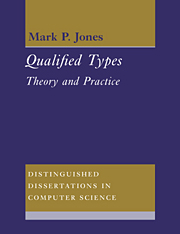Book contents
2 - Predicates
Published online by Cambridge University Press: 05 May 2010
Summary
The key feature of a system of qualified types that distinguishes it from other systems based solely on parametric polymorphism is the use of a language of predicates to describe sets of types (or more generally, relations between types). Exactly which sets of types and relations are useful will (of course) vary from one application to another and it does not seem appropriate to base a general theory on any particular choice. Our solution, outlined in this chapter, is to work in a framework where the properties of a (largely unspecified) language of predicates are described in terms of an entailment relation that is expected to satisfy a few simple laws. In this way, we are able to treat the choice of a language of predicates as a parameter for each of the type systems described in subsequent chapters. This approach also has the advantage that it enables us to investigate how the properties of particular type systems are affected by properties of the underlying systems of predicates.
The basic notation for predicates and entailment is outlined in Section 2.1. The remaining sections illustrate this general framework with applications to: Haskell-style type classes (Section 2.2), subtyping (Section 2.3) and extensible records (Section 2.4). Although we consider each of these examples independently, this work opens up the possibility of combining elements of each in a single concrete programming language.
Basic definitions
For much of this thesis we deal with an abstract language of predicates on types.
- Type
- Chapter
- Information
- Qualified TypesTheory and Practice, pp. 6 - 15Publisher: Cambridge University PressPrint publication year: 1994



